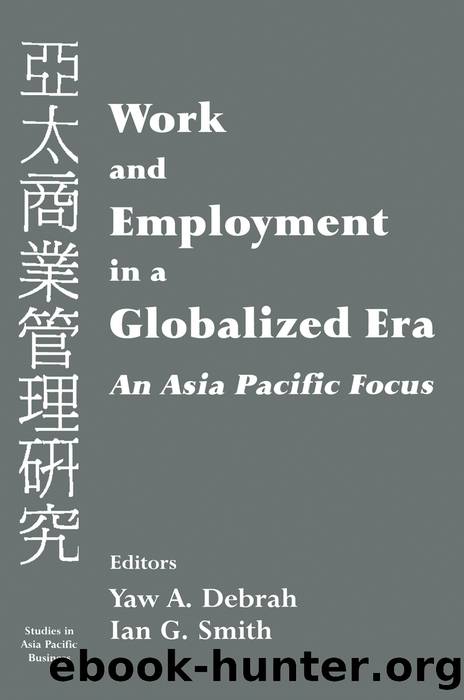Work and Employment in a Globalized Era: An Asia Pacific Focus by Yaw A. Debrah & Ian G. Smith

Author:Yaw A. Debrah & Ian G. Smith [Debrah, Yaw A. & Smith, Ian G.]
Language: eng
Format: epub
ISBN: 9781135311223
Goodreads: 21552825
Publisher: Routledge
Published: 2001-06-01T00:00:00+00:00
THE INTERNATIONALIZATION OF THE ACADEMIC PROFESSION
International travel by the academic profession is by no means a new phenomenon (Schuster, 1994; Le Goff, 1993). During the fifth century BC Sophists from all over the Greek-speaking world travelled while giving lessons for pay (Ehrenberg, 1973). By the twelfth century national and international travel was an integral part of the academic profession. This was largely due to the international character of existing universities which attracted students and masters from all over the mediaeval world. Further, some universities deliberately set out to recruit foreign academics in order to strengthen their own position and status as institutions of learning. This is an important point, bearing in mind that contemporary institutions often use a similar recruitment strategy (Schuster, 1994).
The rapid development of education after the Second World War led to a dramatic increase in the number of universities in many countries (Boyer, Altbach and Whitelaw, 1994). Of particular significance was the movement from elite to mass higher education in countries like the US, UK, Canada, Australia and New Zealand. In addition, the more recent expansion of education in developing countries throughout Asia, the Middle East and South America has led to an increase in the demand for academics to fill the growing number of positions available (Gonzalez, 1992). However, growth in demand cannot always be satisfied within national boundaries. This is particularly true for developing countries with insufficient numbers of appropriately qualified and experienced staff âin the pipelineâ. Those who have the appropriate qualifications and experience may not wish to take the positions that are available because of negative perceptions associated with an academic career (Gonzalez, 1992) and instead may prefer to find employment in the business sector with the potential of much higher pay. In these situations overseas recruitment becomes a popular option. For example in countries like Indonesia, Singapore and the United Arab Emirates recruiting academics from overseas satisfies the growth in demand for faculty as well as ensuring continued development of local education systems.
With the international development of education systems a situation has also arisen where âmore academics than ever before now benefit from exchanges with colleagues in countries far from homeâ (Altbach and Lewis, 1996: 4). There is empirical support for this in the first international survey of the academic profession, carried out under the aegis of the Carnegie Foundation (Boyer et al., 1994). This survey found that over half of respondents in ten of the countries studied had made at least one trip abroad for the purposes of research or study. Further, more than half of those who had been overseas had been for one month or more (see Table 1).
In addition to taking part in exchanges, the Carnegie Foundation study found that academics are independently seeking positions overseas, which means that an increasing number of universities have an international faculty. This same study classified 32 per cent of academic staff in Hong Kong and 42 per cent in Israel as international. However caution must be exercised here because it uses
Download
This site does not store any files on its server. We only index and link to content provided by other sites. Please contact the content providers to delete copyright contents if any and email us, we'll remove relevant links or contents immediately.
Zero to IPO: Over $1 Trillion of Actionable Advice from the World's Most Successful Entrepreneurs by Frederic Kerrest(4524)
Machine Learning at Scale with H2O by Gregory Keys | David Whiting(4295)
Never by Ken Follett(3937)
Harry Potter and the Goblet Of Fire by J.K. Rowling(3848)
Ogilvy on Advertising by David Ogilvy(3604)
Shadow of Night by Deborah Harkness(3360)
The Man Who Died Twice by Richard Osman(3072)
Book of Life by Deborah Harkness(2931)
The Tipping Point by Malcolm Gladwell(2914)
Will by Will Smith(2911)
0041152001443424520 .pdf by Unknown(2843)
Purple Hibiscus by Chimamanda Ngozi Adichie(2827)
My Brilliant Friend by Elena Ferrante(2824)
How Proust Can Change Your Life by Alain De Botton(2807)
How to Pay Zero Taxes, 2018 by Jeff A. Schnepper(2646)
Hooked: A Dark, Contemporary Romance (Never After Series) by Emily McIntire(2550)
Rationality by Steven Pinker(2352)
Can't Hurt Me: Master Your Mind and Defy the Odds - Clean Edition by David Goggins(2324)
Borders by unknow(2303)
